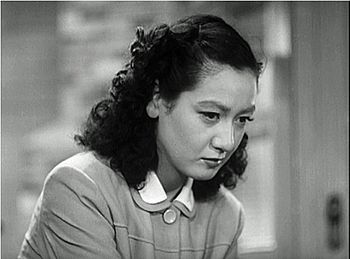With Monsieur Verdoux (1947), Charles Chaplin tried to write a comedy, or at least a comic tragedy (which I distinguish from a tragicomedy). The humor and the dark elements of the film do not gel, however, and that is just the beginning of its problems. To support his crippled wife and young son, Henri Verdoux (Chaplin), a laid-off bank clerk, marries and murders, for their money, middled-aged women. Granted, the movie is thought-provoking, but contains no sympathy for the women—and one man—Verdoux kills. Just as bad, and tasteless, near the end it attempts to give the serial murderer the high moral ground in a wicked world. The attempt is unsuccessful. Really, Verdoux is remarkably foolish, a failed comic tragedy. Moreover, unlike co-stars Martha Raye and Isobel Elsom, who are credible, Chaplin is monotonous in his performance.
Another great, or at least very good, Yasujiro Ozu film, Late Spring (1949) concerns a young Japanese woman, Noriko (Setsuko Hara), whose 56-year-old father (Chisu Ryu) wants her to marry despite the daughter’s insistence that she is happy simply to live with and take care of the middle-aged gent. Indeed, it is a matter not only of happiness but also of obligation—in Noriko’s eyes, not the eyes of others. Sadly, Noriko feels despondent over the upcoming matrimony she has agreed to.
This Ozu (director-scenarist)-Kogo Noda (scenarist) adaptation of a novel is excellent on the theme of painful transitions, and as open-eyed about loneliness as other Ozu films. There are longueurs here and rather too much music, but certainly the film is far more interesting than the boring Noh play several of the characters serenely watch. Hara is superlative and Ozu’s style a gentle wonder ready to undergo a nice extension for such later movies as Tokyo Story.
(In Japanese with English subtitles)
In Trap, by M.Night Shyamalan, a psychopathic killer/family man does everything he can to escape the trap orchestrated for him by multiple police. With a certain guilelessness (except for Josh Hartnett) the cast is largely appealing. Hartnett succeeds as the killer; Alison Pill is unerring as his wife. But the film doesn’t come off. Shyamalan is no writer. There is in Trap, as Ross Douthat indicates, a “ludicrous but memorable setup.” It is ludicrous, though.
River’s Edge, a 1987 film directed by Tim Hunter and scripted by Neal Jiminez, is a mankind-bashing drama which borrows its subject from an incident in Milpitas, California in 1981. A teen boy has just strangled his girlfriend and left her naked body on a riverbank. All but one of his teen buddies keep mum about it, and to be sure the adults in the film hardly inspire confidence regarding the disclosure of such information. . . A bitterly tragicomic concoction, this, but one whose plot is very rickety and essentially unsatisfying—and whose musical score is intrusively bad. It’s fine that Jiminez hits the adults as hard as the kids, but this doesn’t mean the adults are represented intelligently. They aren’t.
Pauline Kael was right that River’s Edge is “a slack mixture of ‘important’ and mediocre.”

Mrs. Ross, in the Bryan Forbes film The Whisperers (1967), is an elderly woman who lives alone and whose mind is leaving her. She is often ill-treated. Based on a novel by Robert Nicolson, this is another Sixties British piece about the working class, with concentration on human callousness.
The technical-artistic efforts of director Forbes and editor Anthony Harvey are estimable. So is Forbes’s scriptwriting except that the movie’s finish minimizes loneliness. The celebrated Dame Edith Evans is magnificent in the difficult part of Mrs. Ross. There is a persistent simple dignity in the intelligent portrayal here. As the husband who abandoned Mrs. Ross, Eric Portman is superlative.



